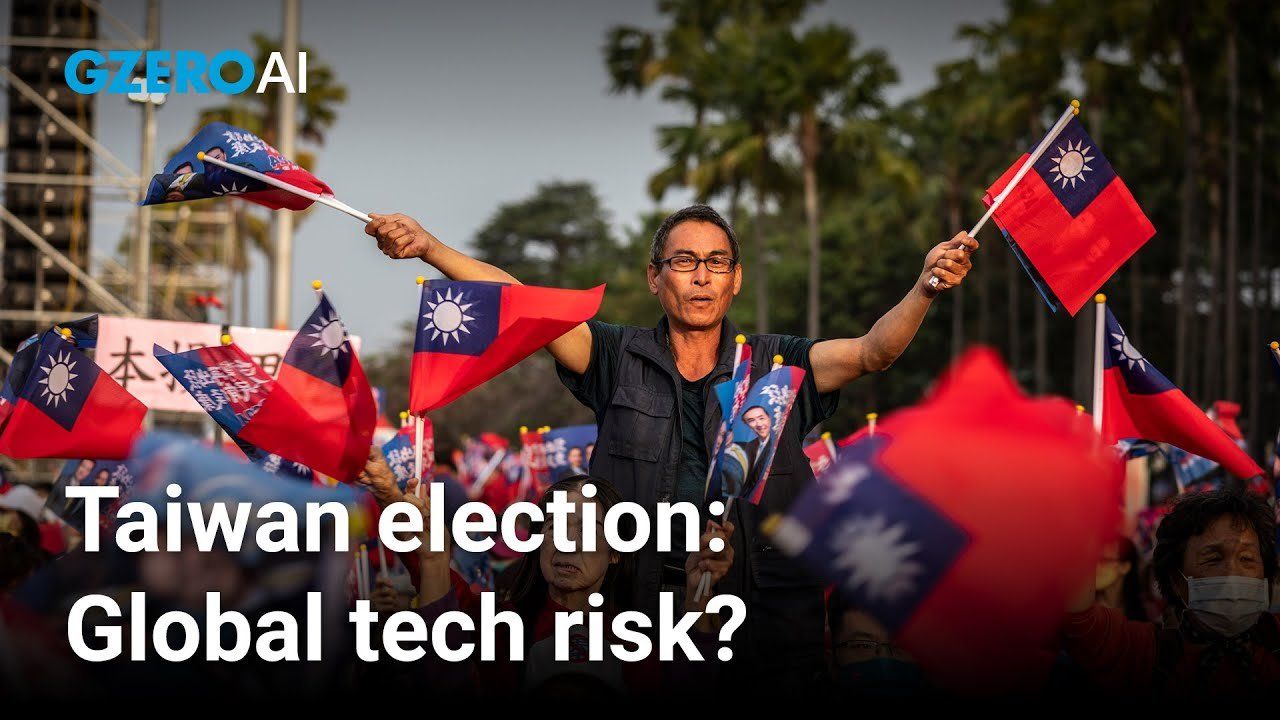Taylor Owen, professor at the Max Bell School of Public Policy at McGill University and director of its Centre for Media, Technology & Democracy, co-hosts GZERO AI, our new weekly video series intended to help you keep up and make sense of the latest news on the AI revolution. In this episode of the series, Taylor Owen looks at the first election in Taiwan and the implications it could have for the future of technology, including AI.
Hi, I'm Taylor Owen. This is GZERO AI. So welcome to 2024, the year where over 50 Democratic countries head to the polls. And we're only a few days away from the first.
On January 13, Taiwanese voters will head to the ballot to elect a new president in an election that could have a profound effect on the global economy and on the future of AI. Let me explain. So the front-runner in this election is Lai Ching-te, a member of the incumbent Democratic Progressive Party. Lai is generally viewed as being in favor of Taiwanese independence, but the Chinese Communist Party has called him a separatist with a confrontational mentality.
But what does this have to do with the future of AI? Well, it all revolves around a single company, the Taiwan Semiconductor Manufacturing Company or TSMC. TSMC makes more than 90% of the world's most advanced chips, the kinds of chips that power much of artificial intelligence. And they make those chips on the Western coast of Taiwan, only 110 miles from mainland China.
So let's assume that Democratic Progressive Party wins, as many expect they will, and that the conflict with Beijing escalates. Well, what happens then? Well, it seems to me there are at least two possibilities. One is that because China is so dependent on TSMC, as we all are, for their chips, that they wouldn't risk an actual attack. This is often referred to as Taiwan Silicon Shield, a kind of new era of mutually assured destruction.
The other possibility, though, is that China does attack Taiwan. And if that happens, it's not inconceivable that Taiwan would preemptively destroy TSMC's manufacturing facilities. And even if China did take control, before that happens, it's unlikely they could continue production. Chip manufacturing is just too contingent on global cooperation.
If TSMC ultimately goes down, the global technology industry could be thrown into turmoil. Virtually no country in the world would be able to build cell phones or cell phone towers. PC production would fall by at least a third, maybe half, and everything from the appliance industry to the automotive industry would take a hit. It would be a global economic crisis, and the progress on AI would be set back years.
While it remains to be seen how this story will play out, one thing is really clear. The global computing industry has a number of incredibly vulnerable choke points, companies like TSMC that an entire industry is dependent on. While diversifying something as complex as chip manufacturing will be difficult and require a ton of capital and real democratic leadership, it may be essential if you want to stabilize the industry. Otherwise, the future of technology may be vulnerable to the whims of volatile players like the CCP.
I'm Taylor Owen and thanks for watching.
More For You
In this Quick Take, Ian Bremmer addresses the killing of Alex Pretti at a protest in Minneapolis, calling it “a tipping point” in America’s increasingly volatile politics.
Most Popular
Who decides the boundaries for artificial intelligence, and how do governments ensure public trust? Speaking at the 2026 World Economic Forum in Davos, Arancha González Laya, Dean of the Paris School of International Affairs and former Foreign Minister of Spain, emphasized the importance of clear regulations to maintain trust in technology.
Will AI change the balance of power in the world? At the 2026 World Economic Forum in Davos, Ian Bremmer addresses how artificial intelligence could redefine global politics, human behavior, and societal stability.
Ian Bremmer sits down with Finland’s President Alexander Stubb and the IMF’s Kristalina Georgieva on the sidelines of the World Economic Forum to discuss President Trump’s Greenland threats, the state of the global economy, and the future of the transatlantic relationship.
